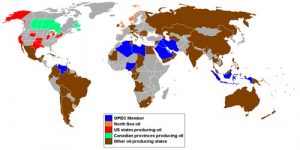Organization Of The Petroleum Exporting Countries (OPEC+) Plus:

The United Arab Emirates (UAE) pushed back against a plan by the Organization of the Petroleum Exporting Countries (OPEC+) Plus group to extend the global pact to cut oil production beyond April 2022.
The Output Pact & Fluctuating Oil Price:
- The OPEC+ group of countries had, in April 2020, entered into a two-year agreement (Output Pact), which entailed steep cuts in crude production to deal with a sharp fall in the price of oil as a result of the Covid-19 pandemic.
- The price of Brent crude hit an 18-year low of under USD 20 per barrel in April 2020 as economic activity around the world crashed as countries dealt with the pandemic.
- In November 2020, the prices started rising and in July 2021, they were USD 76.5 per barrel mainly due to the steady rollout of vaccination programmes around the world.
- OPEC+, however, maintained lower levels of production despite crude oil prices reaching pre-Covid levels, with Saudi Arabia, notably, announcing a further cut in production of 1 million barrels per day for the February-to-April period, which helped boost rising prices even further.
- The OPEC+ group ran into sharp criticism from developing economies, including India, for deliberately maintaining low supply levels to raise prices.
- In April, OPEC+ agreed to gradually increase crude production, including a phased end to Saudi Arabia’s 1 million barrel per day cut in production by July.
- UAE agreed that there was a need to increase crude oil production from August 2021, but did not agree to a condition by the OPEC Joint Ministerial Monitoring Committee (JMMC) that the two-year production agreement be extended by six months.
- The UAE’s key objection to the existing agreement is the reference output used to calculate the total production apportioned to each oil-exporting country.
- The baseline production level reference used in the current agreement was not reflective of the UAE’s production capacity and, therefore, led to the UAE being apportioned a lower share of total production of crude oil.
- UAE would be open to extending the agreement if baseline production levels were reviewed to be fair to all parties.




